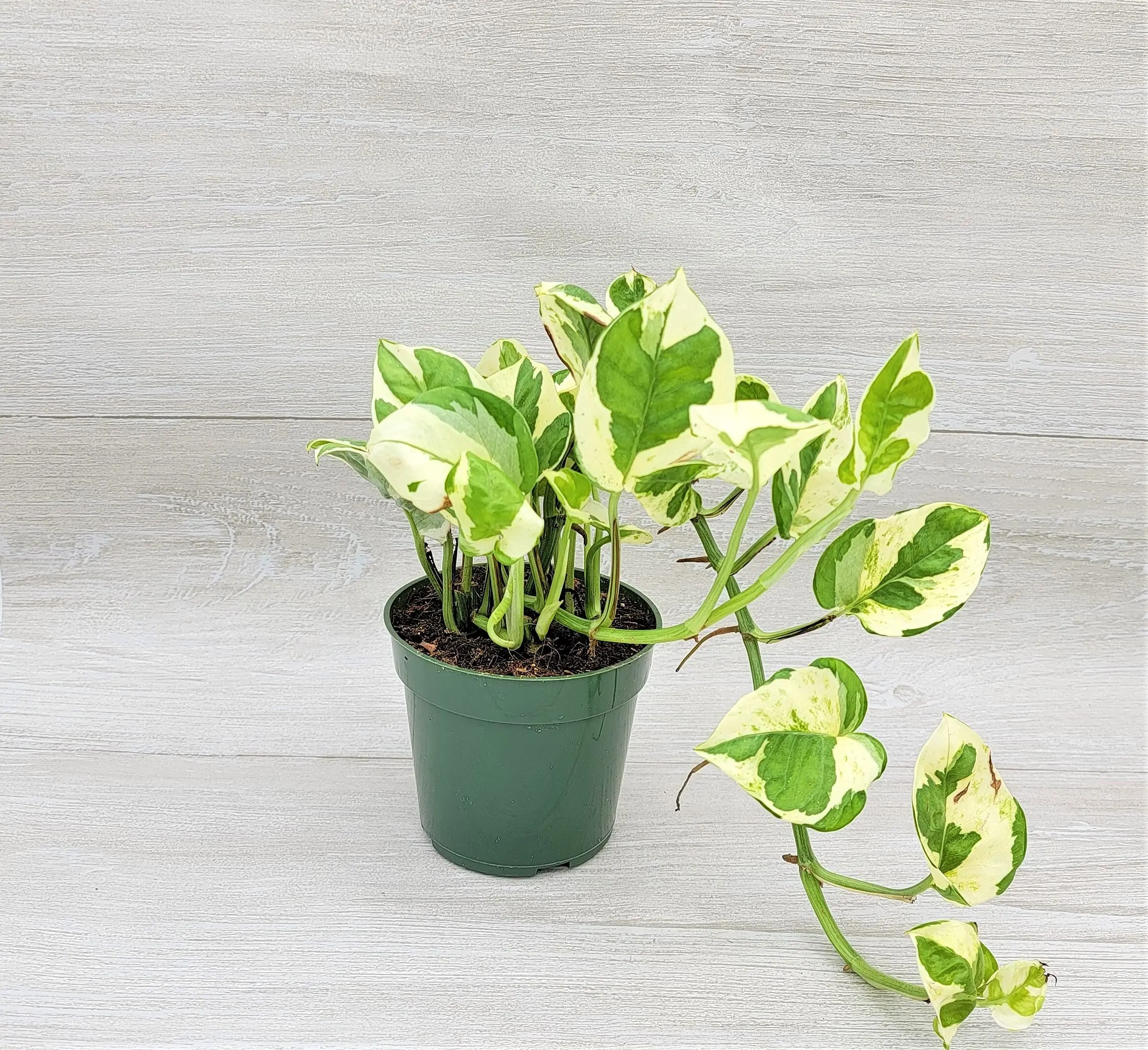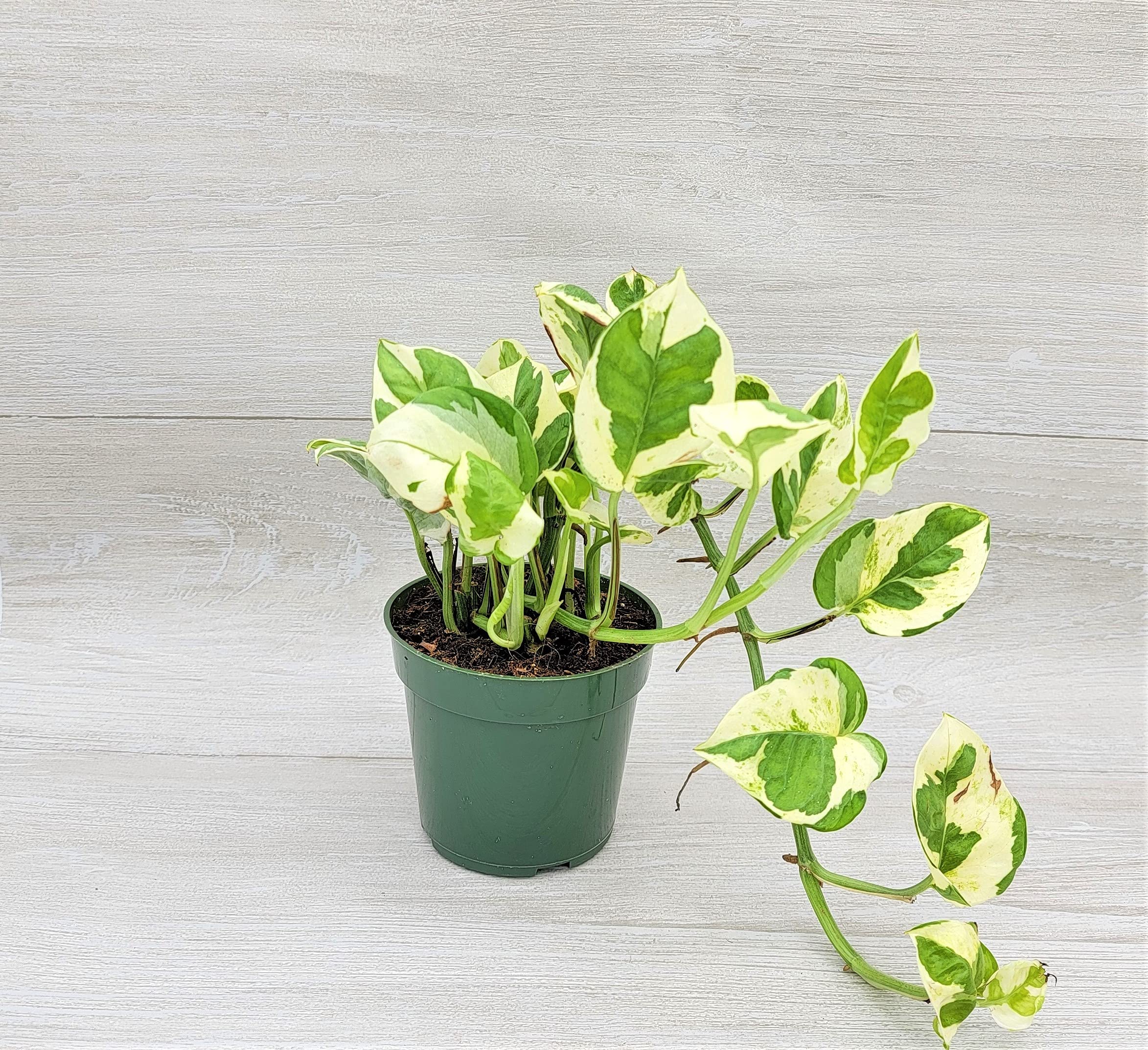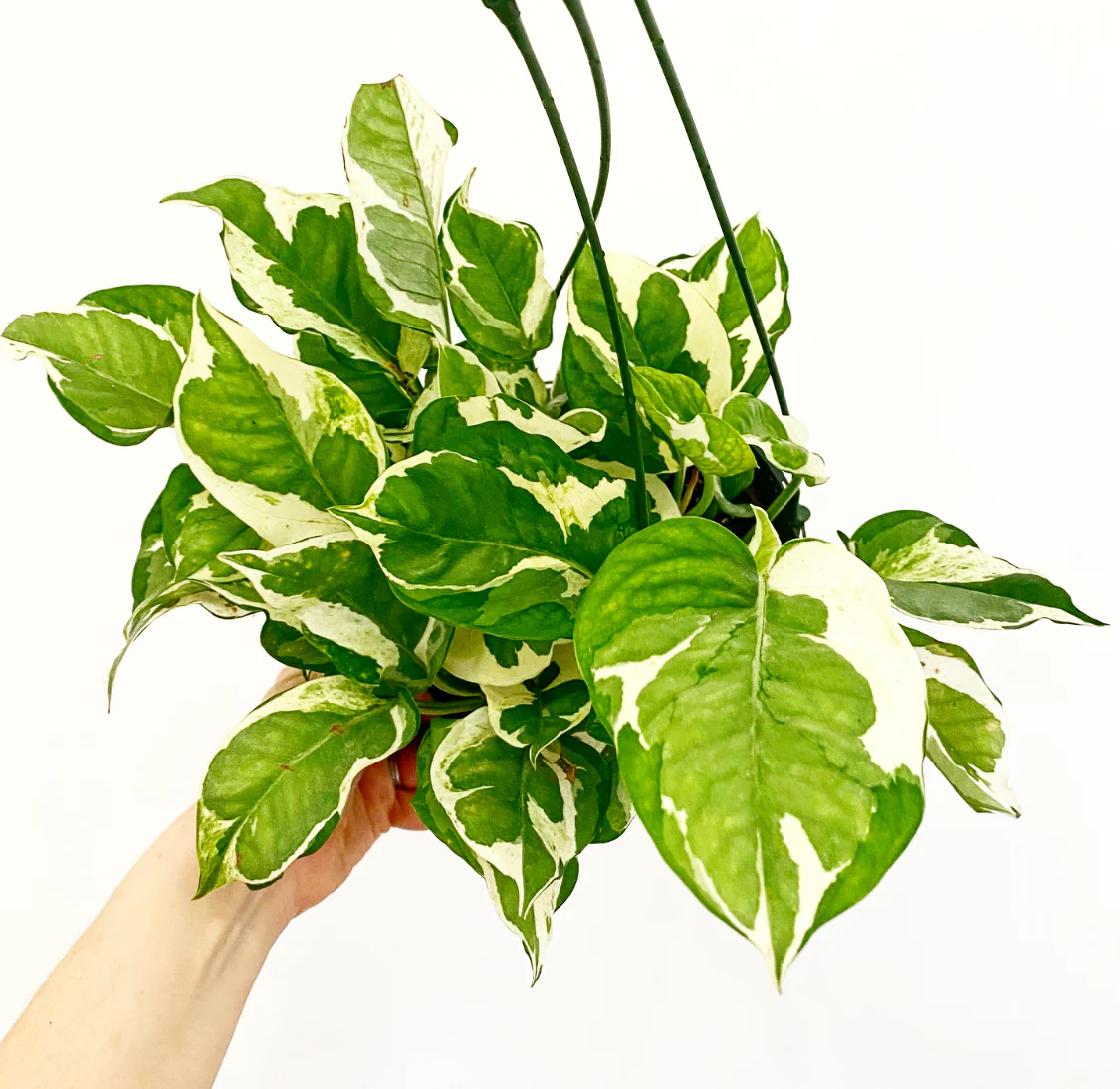Epipremnum N'joy
Epipremnum N'joy is a cultivar of pothos that is known for its variegated leaves with splashes of white, yellow, and green. As an easy-to-grow houseplant, Epipremnum N'joy adds visual interest and greenery to any indoor space.
Epipremnum N'joy has its origins as a mutation of the popular golden pothos. The white and yellow variegation gives it a joyful, confetti-like appearance that inspired its name “N’joy.” Beyond the appeal of its foliage, Epipremnum N'joy possesses many positive attributes that make it an excellent houseplant choice for beginners and plant parents.

Light and Water Requirements
Epipremnum N'joy thrives in bright, indirect light. Although it tolerates low light conditions, its leaves will turn greener and lose their vibrancy without enough light. It should be watered when the top inch or two of soil becomes dry. Allow the soil to dry out moderately between waterings. These pothos do best with a pebble tray or regular misting to increase humidity.
Ideal conditions for Epipremnum N’joy are daytime temperatures of 65-80°F and nighttime temps around 60°F. Avoid placing this plant in drafty areas or allowing it to experience temperature drops below 50°F.
For those looking to delve deeper into the best practices for indoor and outdoor care of Epipremnum varieties, including light and water requirements, check out the "5 Essential Tips for Thriving Epipremnum Indoors & Outdoors". This guide offers valuable insights into creating the ideal environment for these versatile plants.
Fertilizer Needs
During the growing season from spring through summer, Epipremnum N’joy benefits from monthly or biweekly applications of a balanced liquid fertilizer diluted to half strength. Reducing fertilizer in fall and winter allows the plant to harden off for its natural period of dormancy.
To gain a better understanding of fertilizing Epipremnum and other similar plants, I recommend reading "5 Easy Steps to Lush Epipremnum Growth: Master Pothos Care Today!". This article provides detailed information on the nutritional needs of these plants and how to meet them effectively.
Rooting Stem Cuttings in Water
Epipremnum N’joy propagates readily from stem cuttings. Simply use a clean, sharp knife or scissors to take 4-6 inch tip cuttings below a leaf node. Remove lower leaves and place the cutting in a jar of room temperature water. Change the water weekly as the roots develop. Once the roots reach 2-3 inches long, plant the cutting in indoor potting mix. Keep it moderately moist while establishing. Within a couple months, the cutting will develop into a full plant.
Other Propagation Methods
This pothos can also propagate by layering a trailing vine on top of potting soil and pinning it in place. New roots will emerge at nodes touching the soil. Once established, cut behind the newly rooted area and pot up the vine section.
Another option is air layering by wrapping damp sphagnum moss around a stem section and allowing aerial roots to grow into in before severing as a separate plant.
If you're interested in learning more about propagation techniques for Epipremnum, don't miss the "5 Easy Steps to Multiply Your Golden Pothos at Home!". This resource is perfect for those looking to expand their Epipremnum collection through simple and effective propagation methods.

"Discover the charm of Epipremnum N'joy! Click now to bring this stunning, easy-care plant into your home. Perfect for brightening up any space, don't miss out on adding this green gem to your collection. Shop now!"
Hanging Baskets
The trailing vines and divided leaves of Epipremnum N’joy make this plant ideally suited for hanging baskets. Allow the vines to spill over the sides of a basket suspended from hooks or macrame hangers. Position the hanging pothos basket in front of a bright window where its foliage can trail gracefully. Remember to check soil moisture often since pots dry out quicker than in-ground plantings.
Shelves and Tabletops
Place Epipremnum N’joy in planters or cache pots on shelves where its variegated leaves can cascade down. The visual interest of its combined hues brightens up bookcases, kitchen windowsills, desks, side tables, console tables, buffets, bathroom counters, and more. Situate in spots that receive ample ambient daylight. Rotate the planter occasionally so all sides get equal lighting exposure.
Epipremnum N’joy Green
Very similar to the original Epipremnum N’joy but with darker green variegation rather than bright golden patches. The green and white coloration offers a more subtle effect than the bold yellow and green confetti pattern. However, it requires the same care and exhibits equally vigorous trailing growth.
Epipremnum Golden N’joy
An even showier variety where nearly the entire leaf shows vibrant yellow variegation with only splashes of green. The predominance of yellow makes this cultivar appear even more radiant and eye-catching. Provide the same conditions and care as standard Epipremnum N’joy.

Shipping: Door to door shipping, fast and safe with Dragon Courier
Biodiversity: Thailand is known for its rich biodiversity, including a wide variety of aroid species. This diversity allows importers to access a broad range of unique and exotic aroid plants.
Quality and Health of Plants: The suitable climate helps the plants grown here stay healthy and of high quality.
Cost-Effectiveness: Due to favorable growing conditions and efficient production methods, Thai aroid plants can often be more cost-effective compared to those from other countries.
Access to Hybrid Varieties: Thai growers are often involved in the development of new hybrid aroid varieties, offering unique plants that may not be available from other sources.
Epipremnum species are the most sought after by aroid plant lovers
Yellowing Leaves
If mature leaves turn yellow, it often indicates overwatering. Allow the soil to dry out more between waterings. Remove any saturated soil or roots showing signs of rot. Apply less frequent liquid fertilizer applications to avoid buildup of mineral salts.
Sparse Foliage
When nodes along the stems have large gaps between leaves, it signifies insufficient light. Move the plant closer to a bright window or supplement with a grow light. Prune back overgrown, leggy stems and propagate new plants from the healthier cuttings.
Brown Leaf Edges
Crispy brown margins on the leaves generally arise from low humidity. Use a pebble tray, humidifier, or regular misting to increase moisture in the air. Keep the plant out of heating and cooling drafts which accelerate moisture loss from leaves.
With its brightly variegated foliage, cascading growth habit, and versatility for displays, Epipremnum N’joy remains one of the most widely available and adaptable houseplants. For beginners and experts alike, this pothos delivers visual excitement and pops of color to highlight any well-lit indoor space. When provided with filtered sunlight, moderate watering, and average room temperatures, Epipremnum N’joy rewards plant parents with vigorous trails of gorgeous leaves in a joyful palette of green, yellow, and white.
https://bit.ly/3P6mlLH
Epipremnum N'joy has its origins as a mutation of the popular golden pothos. The white and yellow variegation gives it a joyful, confetti-like appearance that inspired its name “N’joy.” Beyond the appeal of its foliage, Epipremnum N'joy possesses many positive attributes that make it an excellent houseplant choice for beginners and plant parents.

Growth Habits
Light and Water Requirements
Epipremnum N'joy thrives in bright, indirect light. Although it tolerates low light conditions, its leaves will turn greener and lose their vibrancy without enough light. It should be watered when the top inch or two of soil becomes dry. Allow the soil to dry out moderately between waterings. These pothos do best with a pebble tray or regular misting to increase humidity.
Ideal conditions for Epipremnum N’joy are daytime temperatures of 65-80°F and nighttime temps around 60°F. Avoid placing this plant in drafty areas or allowing it to experience temperature drops below 50°F.
For those looking to delve deeper into the best practices for indoor and outdoor care of Epipremnum varieties, including light and water requirements, check out the "5 Essential Tips for Thriving Epipremnum Indoors & Outdoors". This guide offers valuable insights into creating the ideal environment for these versatile plants.
Fertilizer Needs
During the growing season from spring through summer, Epipremnum N’joy benefits from monthly or biweekly applications of a balanced liquid fertilizer diluted to half strength. Reducing fertilizer in fall and winter allows the plant to harden off for its natural period of dormancy.
To gain a better understanding of fertilizing Epipremnum and other similar plants, I recommend reading "5 Easy Steps to Lush Epipremnum Growth: Master Pothos Care Today!". This article provides detailed information on the nutritional needs of these plants and how to meet them effectively.
Propagation
Rooting Stem Cuttings in Water
Epipremnum N’joy propagates readily from stem cuttings. Simply use a clean, sharp knife or scissors to take 4-6 inch tip cuttings below a leaf node. Remove lower leaves and place the cutting in a jar of room temperature water. Change the water weekly as the roots develop. Once the roots reach 2-3 inches long, plant the cutting in indoor potting mix. Keep it moderately moist while establishing. Within a couple months, the cutting will develop into a full plant.
Other Propagation Methods
This pothos can also propagate by layering a trailing vine on top of potting soil and pinning it in place. New roots will emerge at nodes touching the soil. Once established, cut behind the newly rooted area and pot up the vine section.
Another option is air layering by wrapping damp sphagnum moss around a stem section and allowing aerial roots to grow into in before severing as a separate plant.
If you're interested in learning more about propagation techniques for Epipremnum, don't miss the "5 Easy Steps to Multiply Your Golden Pothos at Home!". This resource is perfect for those looking to expand their Epipremnum collection through simple and effective propagation methods.

"Discover the charm of Epipremnum N'joy! Click now to bring this stunning, easy-care plant into your home. Perfect for brightening up any space, don't miss out on adding this green gem to your collection. Shop now!"
Display Ideas
Hanging Baskets
The trailing vines and divided leaves of Epipremnum N’joy make this plant ideally suited for hanging baskets. Allow the vines to spill over the sides of a basket suspended from hooks or macrame hangers. Position the hanging pothos basket in front of a bright window where its foliage can trail gracefully. Remember to check soil moisture often since pots dry out quicker than in-ground plantings.
Shelves and Tabletops
Place Epipremnum N’joy in planters or cache pots on shelves where its variegated leaves can cascade down. The visual interest of its combined hues brightens up bookcases, kitchen windowsills, desks, side tables, console tables, buffets, bathroom counters, and more. Situate in spots that receive ample ambient daylight. Rotate the planter occasionally so all sides get equal lighting exposure.
Varieties
Epipremnum N’joy Green
Very similar to the original Epipremnum N’joy but with darker green variegation rather than bright golden patches. The green and white coloration offers a more subtle effect than the bold yellow and green confetti pattern. However, it requires the same care and exhibits equally vigorous trailing growth.
Epipremnum Golden N’joy
An even showier variety where nearly the entire leaf shows vibrant yellow variegation with only splashes of green. The predominance of yellow makes this cultivar appear even more radiant and eye-catching. Provide the same conditions and care as standard Epipremnum N’joy.

Where to buy Epipremnum N’joy? Benefits from importing plants from Thailand
Shipping: Door to door shipping, fast and safe with Dragon Courier
Biodiversity: Thailand is known for its rich biodiversity, including a wide variety of aroid species. This diversity allows importers to access a broad range of unique and exotic aroid plants.
Quality and Health of Plants: The suitable climate helps the plants grown here stay healthy and of high quality.
Cost-Effectiveness: Due to favorable growing conditions and efficient production methods, Thai aroid plants can often be more cost-effective compared to those from other countries.
Access to Hybrid Varieties: Thai growers are often involved in the development of new hybrid aroid varieties, offering unique plants that may not be available from other sources.
Epipremnum species are the most sought after by aroid plant lovers
Troubleshooting Issues
Yellowing Leaves
If mature leaves turn yellow, it often indicates overwatering. Allow the soil to dry out more between waterings. Remove any saturated soil or roots showing signs of rot. Apply less frequent liquid fertilizer applications to avoid buildup of mineral salts.
Sparse Foliage
When nodes along the stems have large gaps between leaves, it signifies insufficient light. Move the plant closer to a bright window or supplement with a grow light. Prune back overgrown, leggy stems and propagate new plants from the healthier cuttings.
Brown Leaf Edges
Crispy brown margins on the leaves generally arise from low humidity. Use a pebble tray, humidifier, or regular misting to increase moisture in the air. Keep the plant out of heating and cooling drafts which accelerate moisture loss from leaves.
Conclusion
With its brightly variegated foliage, cascading growth habit, and versatility for displays, Epipremnum N’joy remains one of the most widely available and adaptable houseplants. For beginners and experts alike, this pothos delivers visual excitement and pops of color to highlight any well-lit indoor space. When provided with filtered sunlight, moderate watering, and average room temperatures, Epipremnum N’joy rewards plant parents with vigorous trails of gorgeous leaves in a joyful palette of green, yellow, and white.
https://bit.ly/3P6mlLH
Nhận xét
Đăng nhận xét